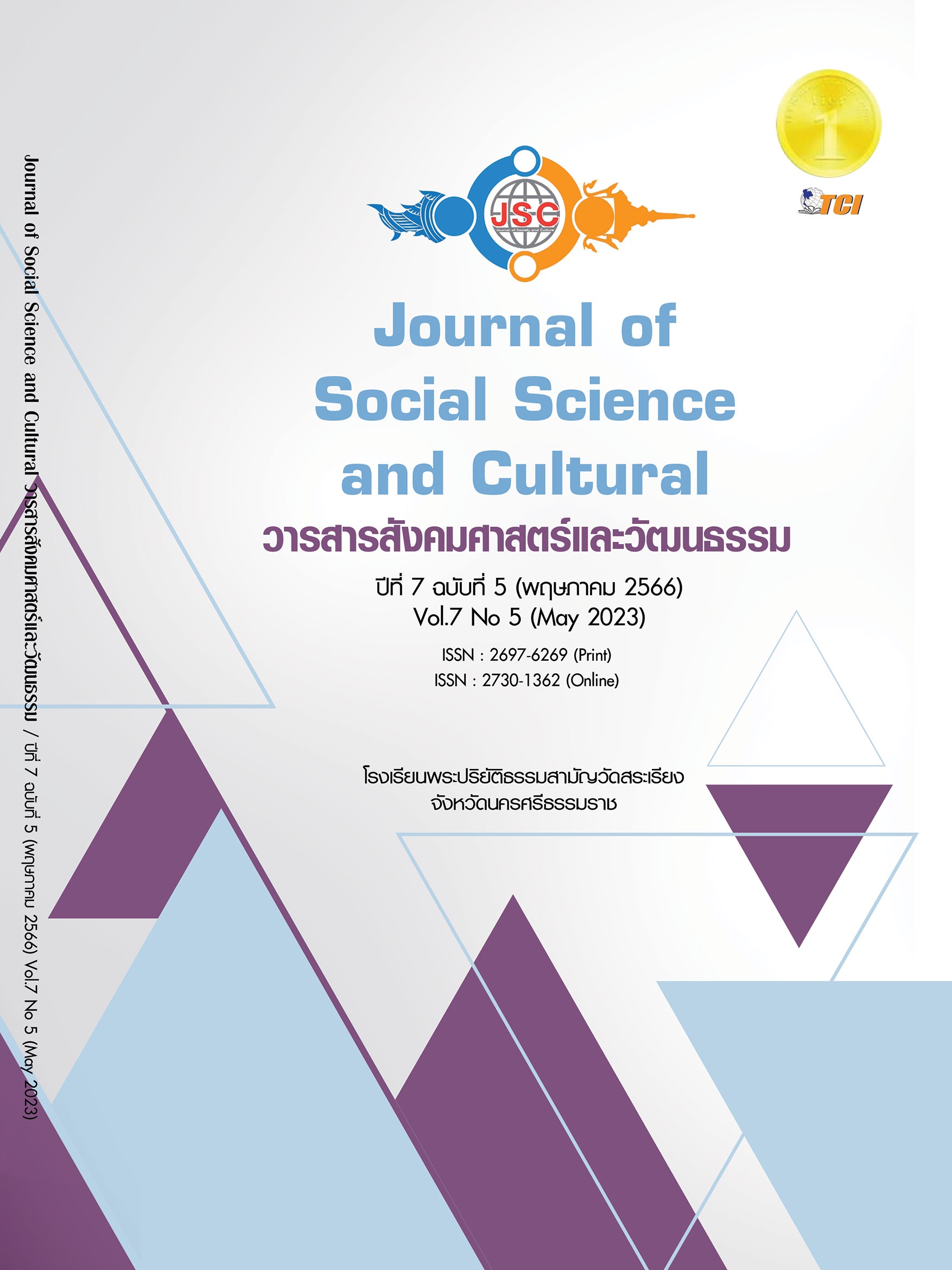THE EFFECTIVENESS OF AN ENRICHMENT OF FINANCIAL LITERACY CURRICULUM BASE ON BRAIN-BASE LEARNING MANAGEMENT OF THE UNDERGRADUATE STUDENTS IN PRIVATE HIGHER EDUCATION
Main Article Content
Abstract
The purpose of this experimental research was to examine the effectiveness of financial literacy curriculum based on brain-based learning management of the undergraduate students in the private higher education by comparing the financial literacy of the experimental group with the control group 39 undergraduate students by purposive random sampling participated in the study. There were 17 undergraduate students in the experimental group and 22 undergraduate students in the control group. In the experimental group, financial literacy curriculum based on brain-based learning management in conjunction with a simulation game was used. On the other hand, the control group got financial literacy knowledge in the classroom. Questionnaires were used as a tool for data collection, 1) For the financial knowledge, the difficulty valued Item-Total Correlation was .20 – .67, the reliability of each measure (KR – 20) was .89 and Item-Total Correlation was .20 or higher, 2) The financial attitudes and the financial behavior, Item-Total Correlation was .20 or higher and the reliability of each measure ranged from .92 to .97. The data were analyzed by using the descriptive statistic and inferential stat (t-test independent and paired t-test). The result of this study showed that undergraduate students who participated in the financial literacy curriculum based on brain-based learning management in conjunction with a simulation game got more financial literacy scores comparing with the control group at the post-test period with statistical significance at .05.
Article Details
References
Alodail, A. K. (2016). Financial Literacy: What is the Responsibility of Higher-
Education Institutions? Sheri Geddes and Todd Steen, Hope College. Michigan Academician, 183, 347.
Bank of Thailand. (2013). Report of the 2020 Thai financial skills survey. Bangkok: Financial Literacy Promotion Department, Bank of Thailand.
Bank of Thailand. (2016). Report of the 2020 Thai financial skills survey. Bangkok: Financial Literacy Promotion Department, Bank of Thailand.
Degen, R. (2014). Brain-Based Learning: The neurological findings about the
humam brain that every teacher should know to be effective. Amity Global Business Review, 9, 15-23. Doi:10.3791/3237
Hoge, P. T. (2003). “The Integration of Brain-Based Learning and Literacy
Acquisition” Dissertation Abstract International, 63(11): 3884-A; May.
Jensen, E. (2008). Brain-based learning: The new paradigm of teaching (2nd ed.). San
Francisco, CA: Corwin Press.
Kenan Foundation Asia. (2015). Thai Move Forward with Financial Awareness
Project 2015. Bangkok: City Foundation. Retrieved January 18, 2023, from https://readgur.com/doc/2120372/
Loerwald, D. & Stemmann, A. (2016). Behavioral finance and financial literacy:
Educational implications of biases in financial decision making. In C. Aprea, E.Wuttke, K. Breuer, N. K. Koh, P. Davies, B. Greimel-Fuhrmann, & J. S. Lopus, (Eds.), International Handbook of Financial Literacy (pp. 25-38). Singapore: Springer Science+Business Media Singapore.
Marlowe, J. (2014). Governing Guide to Financial Literacy Conecting Money,
Policy and Priorities. USA: The Governing Institute.
Mason, C.L.J. & Wilson, R.M.S. (2000). Conceptualising financial literacy.
Occasional Paper, 2000:7. Loughborough: Business School, Loughborough University.
Maynard, N. et al. (2012). Can Game Build Financial Capability? Financial Entertainment: A
Research Overview: Doorways to Dreams Fund.
OECD. (2015). National strategies for financial education: OECD/INFE policy
handbook. Retrieved from https://www.gpfi.org/
OECD. (2016). PISA 2015 Assessment and analytical framework: Science,
reading, mathematics and Financial literacy. Paris: OECD Publishing.
doi: 10.1787/9789264255425-en.
Ozden, M. & Gultekin, M. (2008). The effects of brain-based learning on
academic achievement and retention of knowledge in Science Course. Electronic Journal of Science Education. 12(1), 1-17.
Ramjitti Institute. (2006). Behavior Investigation on Personal Financial
Management (Money Watch) Project. Retrieved March 15, 2021, from http://www.digitalschool.club/digitalschool/technologym1-3/businessm1_1/more1/lesson4/web4.php
Sevcík, K. (2015). PISA 2012 results: Students and money: Financial literacy
skills for the 21st century (Volume VI). Pedagogicka Orientace, 25(4), 632.
Taljaroen. H. (2007). Effects of Using Web-Based Simulation Games Based on
Constructivism upon Mathematics Achievement of Eighth Grade Students with Different Learning Styles. Degree of Master of Education Program in Audio-Visual Communications. Chulalongkorn University.
Tisdell, E. J. et al. (2013). Community-based financial literacy education in a cultural context: A
study of teacher beliefs and pedagogical practice. Adult Education Quarterly, 63(4), 338-356. doi: 10.1177/0741713613477186
Thongphuak, P. (2018). Effects of Economics Instruction by Using Simulation
Games on Financial Literacy of Upper Secondary School Students. Degree of Master of Education in Curriculum and Instruction. Chulalongkorn University.
Tüfekçi, S., & Demirel, M. (2009). The effect of brain based learning on
achievement, retention, attitude and learning process. Procedia-social and Behavioral sciences, 1(1), 1782-1791.


